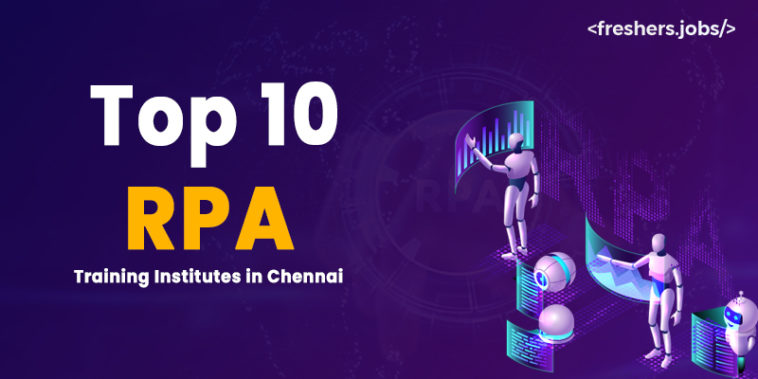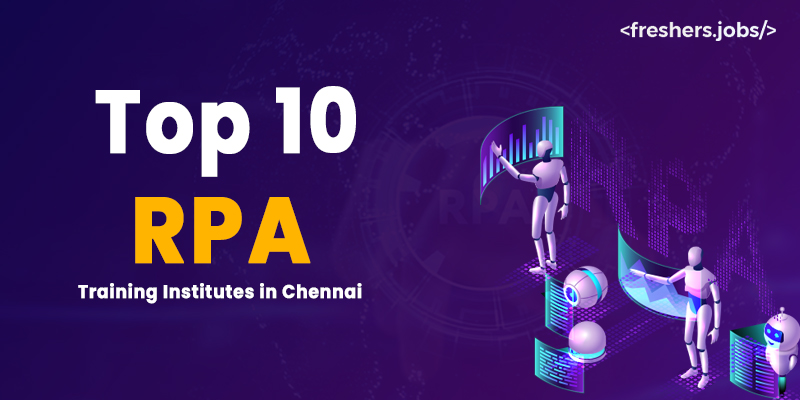RPA, or Robotic Process Automation, is a cutting-edge technology that has gained substantial traction in today’s dynamic business landscape. It involves using software robots or bots to automate repetitive and rule-based tasks. The demand for RPA has surged as businesses seek innovative solutions to stay competitive in an increasingly digital world. RPA offers the advantage of cost-effectiveness, speed, and scalability, enabling companies to automate routine processes across various functions, such as finance, human resources, and customer service.
In today’s business world, where agility and efficiency are paramount, adopting RPA has become a strategic imperative. It empowers organizations to allocate human resources to more strategic and creative tasks, fostering innovation and driving overall business growth. As the demand for digital transformation increases, RPA stands out as a pivotal tool for businesses aiming to optimize their processes and stay ahead in the rapidly evolving global market. We will explore the Top 10 RPA Training Institutes in Chennai, its role in current business, merits, key aspects, and job opportunities.
Following is the list of the Top 10 RPA Training Institutes in Chennai.
- FITA Academy
- Simplilearn
- Intellipaat
- Edureka
- Besant Technologies
- Credo Systemz
- Greens Technologys
- Softlogic Systems
- ACTE
- Inventateq
1. FITA Academy
FITA Academy, a leading training institute, provides a comprehensive range of 120+ courses, available both online and offline. The institute is recognized for delivering essential technical and professional certifications. The academy consistently maintains a prominent position in the industry. With a team of more than 1,000 trainers boasting decades of experience, the institute has positively impacted the learning journeys of more than 75,000 individuals. By establishing multiple branches in Bangalore, Pondicherry, Coimbatore, and Madurai, the academy emphasizes its commitment to delivering top-tier training. This strategic expansion ensures that individuals in diverse regions can access high-quality training opportunities.
Why RPA Training in Chennai at FITA Academy?
FITA Academy delivers comprehensive Robotic Process Automation Training in Chennai, covering fundamental to advanced-level concepts. The training imparts insights into Robotic Business Processes, utilizing tools such as Automation Anywhere, Blue Prism, and UI Path. Thorough training in these tools encompasses Task Bots, Control Room, Task Editor, Command Categories, Control loops, Internet Automation, and Application Automation. The course incorporates real-time capstone projects, enriching hands-on experience in project deployment. The institute provides flexibility in batch schedules at an affordable price, offering weekend and weekday class options. Additionally, participants who complete the training are eligible for placement support.
Customized Curriculum for RPA Course in Chennai
FITA Academy in Chennai offers a tailor-made curriculum for its Robotic Process Automation (RPA) course, meticulously covering the core principles of RPA. The curriculum encompasses key aspects of Automation Anywhere, Blue Prism, and UI Path, along with insights into integration services, workflow modules, high reusability levels, and other fundamental concepts in RPA. Topics also include the architecture of tools, their evolutionary features, the process of adding clients, operations room functionalities, Task Bots and Process Automation, Control Room and Task Editor, and Command Categories and Control Loops. The syllabus further guides students through keystrokes, mouse actions, execution of commands related to programs, files, and windows, web recording, launching websites, internet-related commands, interaction with applications (reading from CSV/text, Excel, databases, and XML), error handling, image recognition, screen capture, integration, OCR, email automation, terminal emulator, PDF integration, running and stopping tasks, managing system-related tasks, printers, services, miscellaneous commands related to interactive prompts, message boxes, clipboards, and more. Additionally, it includes insights into Internet Automation, Application Automation, and Real-Time Capstone Projects, ensuring a comprehensive understanding of RPA principles and preparing students for real-world challenges.
Expert Trainers for the RPA Training Institute in Chennai
FITA Academy’s RPA Course in Chennai is facilitated by expert trainers with extensive hands-on experience in the industry. These dedicated instructors impart theoretical knowledge and share valuable real-world insights with students, keeping them updated on the latest industry trends and ensuring thorough preparation for the dynamic field of RPA.
Project Presentation Sessions
A distinctive feature of FITA Academy‘s RPA Training in Chennai is the inclusion of project presentation sessions. Recognizing the importance of practical experience in mastering RPA and preparing for a successful career, these sessions allow students to apply acquired knowledge and principles in real-world scenarios, providing valuable hands-on exposure.
Complimentary Placement Sessions
FITA Academy goes beyond the classroom by offering complimentary placement sessions as part of its extensive RPA Training in Chennai. These sessions cover essential aspects such as resume building, refining interview skills, job placement assistance, and career guidance. The meticulously designed Placement session aims to help students achieve their career objectives. With a vast network of more than 1,500+ partner companies, FITA Academy facilitates job placements for graduates, providing diverse opportunities within the industry. This extensive network ensures students have access to promising career prospects, facilitating a smooth and successful transition into the professional world.
2. Simplilearn
Simplilearn is recognized as a reputable online platform offering a flexible RPA Course covering fundamental to advanced concepts. While the institute provides a comprehensive array of courses, the primary emphasis on online learning may restrict direct interaction between learners and trainers, potentially leading to higher costs.
3. Intellipaat
Intellipaat specializes in delivering RPA Classes suitable for both beginners and advanced learners, featuring a curriculum enriched with valuable learning materials. However, the strong focus on online classes may impact the extent of direct interaction between instructors and students, and the course cost could be relatively higher compared to alternative institutes.
4. Edureka
Edureka focuses on providing RPA Courses to enhance skills and impart valuable industry knowledge. The predominant emphasis on online courses may reduce direct interaction between learners and trainers, making it potentially less favorable for those seeking a more in-depth learning experience.
5. Besant Technologies
Besant Technologies offers comprehensive RPA Classes with real-time assistance. Despite these facilities, it may not be the preferred choice for individuals seeking a more profound learning experience.
6. Credo Systemz
Credo Systemz specializes in tailored RPA Courses designed to meet industry-specific requirements. However, it may not provide as comprehensive placement support compared to certain other institutes.
7. Greens Technologys
Greens Technologys provides an extensive RPA course to equip learners with essential skills. However, it may not be the ideal choice for those seeking a more extensive and in-depth learning experience compared to other institutes.
8. Softlogic Systems
Softlogic Systems is known for providing specialized RPA Classes tailored to industry-specific needs. However, it may not offer as comprehensive practical training compared to other institutes.
9. ACTE
ACTE specializes in delivering comprehensive RPA Classes covering a range of concepts. While offering these benefits, the level of placement support provided might be relatively less extensive compared to certain other institutes.
10. Inventateq
Inventateq offers RPA courses that focus on imparting essential skills to the students. It’s worth noting that the practical training component may not be extensive compared to some other institutes.
Freshers Jobs meticulously selected these institutes after thorough research, considering factors such as brand reputation, student feedback, and a proven track record of student achievements.
Role of RPS in the current Business Era
Robotic Process Automation (RPA) transforms traditional workflows and operations. RPA uses software robots or bots to automate rule-based, repetitive tasks, freeing human resources for more strategic and complex tasks/ challenges. This technology contributes significantly to increased efficiency, reduced operational costs, and improved accuracy by eliminating manual errors. RPA is particularly valuable in finance, healthcare, and customer service, streamlining processes and enhancing productivity. Its quick implementation, adaptability to existing systems, and scalability make it a versatile solution for organizations seeking to stay agile and competitive in the dynamic business landscape. By automating routine tasks, RPA empowers businesses to allocate human talent to tasks requiring creativity, critical thinking, and strategic decision-making, fostering innovation and driving sustained growth.
What is RPA?
Robotic Process Automation (RPA) is a transformative technology that employs software robots to automate repetitive and rule-based tasks within business processes. These virtual bots are programmed to mimic human interactions with digital systems, performing tasks such as data entry, form filling, and information extraction. RPA enhances operational efficiency by streamlining routine processes, reducing errors, and enabling organizations to save costs. With the ability to integrate seamlessly with existing systems and applications, RPA offers a scalable and non-intrusive solution. It is widely adopted across various industries to optimize workflows, allowing human workers to focus on more strategic and creative tasks. As a key player in digital transformation, RPA contributes to increased productivity and agility in the modern business landscape.
Merits of RPA
- Efficiency and Productivity: RPA automates repetitive and rule-based tasks, significantly enhancing efficiency and productivity. Bots can work around the clock without breaking, leading to quicker task completion and improved operational speed.
- Cost Savings: RPA reduces operational costs by minimizing the need for human intervention in routine processes. This cost-effectiveness results from increased speed, accuracy, and the capability to handle large volumes of tasks without additional manpower.
- Accuracy and Error Reduction: Automation through RPA eliminates the risk of human errors in manual tasks, ensuring consistent and accurate outcomes. This particularly benefits data entry, compliance-related tasks, and other processes requiring precision.
- Quick Implementation: RPA implementations are typically faster than traditional IT solutions. Bots can be deployed relatively quickly, giving organizations rapid returns on their investment and allowing for swift adaptation to changing business needs.
- Flexibility and Scalability: RPA can be adapted to various business processes across different departments. Its scalability allows organizations to expand automation capabilities as needed, making it suitable for both small-scale and enterprise-level implementations.
- Enhanced Customer Experience: Automation through RPA leads to quicker response times and improved accuracy in customer-facing processes. This improves overall customer experience, fostering customer satisfaction and loyalty.
- Integration with Existing Systems: RPA can integrate with existing software applications and systems without significant changes to the underlying infrastructure. This adaptability ensures a seamless incorporation into the existing technological ecosystem.
- Improved Compliance: RPA helps organizations maintain compliance by enforcing consistent and auditable processes. Bots adhere strictly to predefined rules and regulations, reducing non-compliance risk.
- Freeing Human Resources for Strategic Tasks: By automating routine tasks, RPA allows human employees to focus on more strategic, creative, and value-added activities. This contributes to a more engaged and fulfilled workforce.
- Data Security: RPA platforms often include robust security features to protect sensitive data. Access controls, encryption, and audit trails help ensure the security and integrity of automated processes.
Key Components of RPA
- Robotic Process Automation Tools: RPA tools are the software platforms that help in the creation, deployment, and management of software robots. Popular RPA tools include Automation Anywhere, UiPath, and Blue Prism. These tools provide interfaces for designing automation workflows, managing bots, and monitoring their performance.
- Bot or Software Robot: A bot is the execution unit in RPA. It is a software program that follows instructions to perform specific tasks. Bots mimic human interactions with applications, systems, and data, executing rule-based processes efficiently and accurately.
- Process Definition: This involves defining the tasks and steps the bot will automate. It includes creating a workflow or process diagram that outlines the bot’s actions.
- Control Center: The central management console is where administrators can monitor, schedule, and manage the bots’ activities. It provides insights into bot performance, exception handling, and overall system health.
- Development Studio: The development studio is the environment within the RPA tool where developers design and create automation workflows. It includes features for recording actions, defining logic, handling exceptions, and testing the automation before deployment.
- Bot Orchestrator: The bot orchestrator is responsible for scheduling and coordinating the execution of bots. It ensures that bots operate efficiently, avoid conflicts, and follow predefined schedules for task execution.
- Cognitive Automation: Some advanced RPA systems incorporate cognitive automation, which integrates technologies like machine learning and natural language processing. This enables bots to handle complex tasks, understand unstructured data, and adapt to changing conditions.
- Process Discovery: Process discovery tools analyze user interactions with applications to identify potential processes suitable for automation. These tools help organizations discover automation opportunities and prioritize which processes to automate.
- Bot Store: Some RPA platforms offer a bot store where pre-built bots or automation components are available for download and reuse. This can accelerate the development process by providing ready-made solutions for common tasks.
- Analytics and Reporting: Analytics and reporting capabilities provide insights into the performance of bots and the overall impact of automation on business processes. Organizations can track key metrics, identify areas for improvement, and make data-driven decisions.
Job Opportunities in RPA
- RPA Developer / Analyst (Entry Level): RPA Developer/ RPA Analyst/ Automation Developer will develop and implement RPA solutions, design automation workflows, and work closely with business analysts to understand process requirements. They have Knowledge of RPA tools, programming skills (e.g., Python, Java), problem-solving, and analytical skills.
- RPA Developer (Mid-Level): Senior RPA Developer/ Automation Engineer/ RPA Consultant will lead RPA development projects, design and optimize automation processes, collaborate with business stakeholders, and mentor junior developers. They have Advanced RPA tool proficiency, process optimization, leadership, and project management skills.
- RPA Architect (Senior Level): The responsibility of an RPA Architect/ Lead Automation Engineer/ RPA Solution Architect is to design end-to-end RPA solutions, provide technical leadership, create automation strategies, and collaborate with IT and business leaders. They have in-depth RPA tool expertise, architecture design, system integration, and strategic planning.
- RPA Project Manager: RPA Project Manager/ Automation Project Lead/ RPA Program Manager will manage RPA projects from initiation to completion, coordinate with cross-functional teams, and ensure project delivery on time & within budget. They have skills like project management, leadership, communication, and a solid understanding of RPA technologies.
- RPA Business Analyst: RPA Business Analyst/ Automation Business Process Analyst will collaborate with business users to identify automation opportunities, gather requirements, and ensure alignment between business needs and RPA solutions. They have skills like Business process analysis, requirements gathering, communication, and understanding of RPA technologies.
- RPA Quality Assurance (QA) Engineer: RPA QA Engineer/ Automation Test Analyst will develop and execute test cases for RPA solutions, ensuring automated processes’ quality and reliability. They know testing methodologies, quality assurance, attention to detail, and understanding of RPA tools.
- RPA Support Specialist: RPA Support Specialist/ Automation Support Analyst will provide ongoing support for deployed RPA solutions, troubleshoot issues, & ensure the smooth operation of automated processes. They know Technical support, problem-solving, and familiarity with RPA tools.
Robotic Process Automation (RPA) has undeniably emerged as a game-changer in the contemporary business landscape, offering a transformative solution to the challenges of a digital era. As organizations increasingly recognize the value of RPA in enhancing efficiency, reducing costs, and fostering innovation, the demand for skilled professionals in this field will rise. This blog will explore the Top 10 RPA Training Institute in Chennai, their role in the current business landscape, merits, key aspects, and the job opportunities available within the industry.





